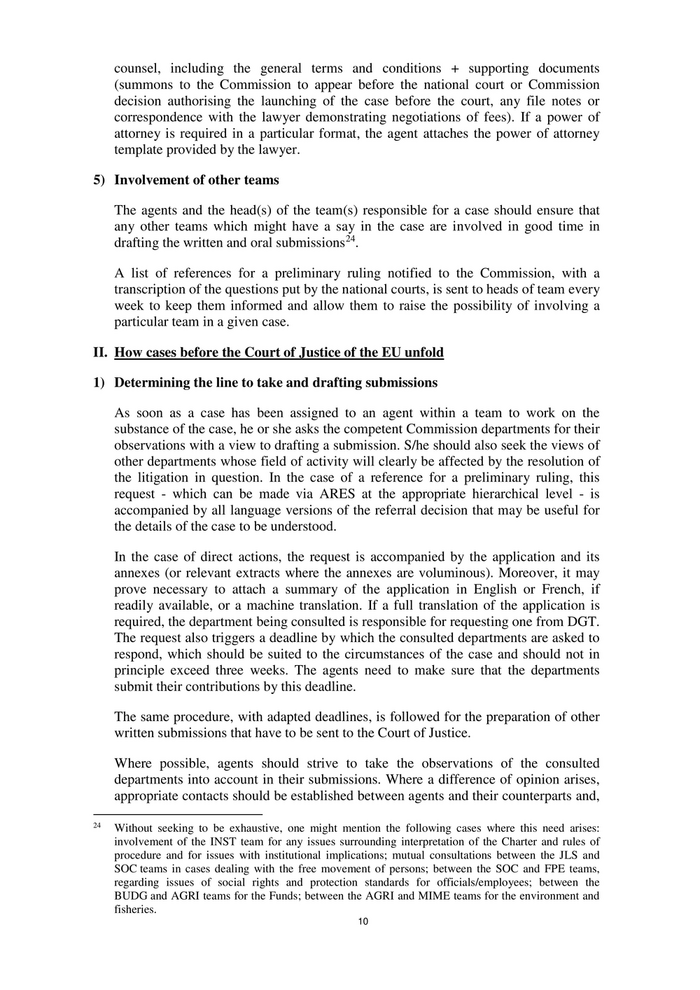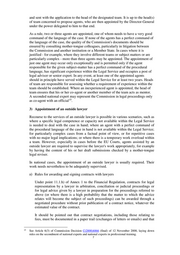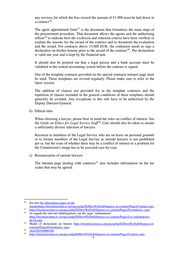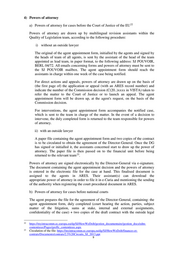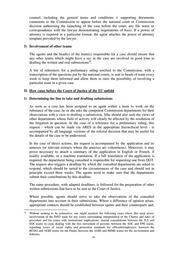Guide-contentieux-EN
Dieses Dokument ist Teil der Anfrage „Legal costs“
EUROPEAN COMMISSION LEGAL SERVICE Brussels, May 2019 This document is an update of the version of July 2017 GUIDE TO THE LITIGATION WORK OF THE LEGAL SERVICE

Table of contents INTRODUCTION ............................................................................................................. 3 I. The Commission's involvement in a case ...................................................... 3 Initiation of a case by the Commission/intervention by the Commission in a pending case .......................................................... 3 Handling of cases notified to the Commission ................................ 5 1) Assignment of cases ........................................................... 5 2) Appointment of agents ...................................................... 6 3) Appointment of an outside lawyer ................................... 7 4) Powers of attorney ............................................................. 9 5) Involvement of other teams ............................................ 10 II. How cases before the Court of Justice of the EU unfold............................ 10 1) Determining the line to take and drafting submissions....................................................................... 10 2) Flagging of sensitive cases ............................................... 11 3) Grand Chamber............................................................... 14 4) Requests for priority treatment or expedited procedure.......................................................................... 14 5) Pleas of inadmissibility .................................................... 14 6) Letters to the Union courts not requiring a reply ........ 14 7) Recording of documents in the Litigation Database ........................................................................... 15 8) Deadlines .......................................................................... 15 9) Filing of written submissions, use of e-Curia ................ 16 10) Translations...................................................................... 18 11) Production of confidential documents ........................... 18 12) Hearings............................................................................ 19 13) Reopening of the oral stage............................................. 20 14) Amicable settlement ........................................................ 20 15) Relations with other parties/interveners ....................... 20 III. After the decision of the Court of Justice of the EU or of the national court ................................................................................................. 21 1) Distribution of information and analysis ...................... 21 2) Recovery of costs.............................................................. 23 3) Waiver of debt.................................................................. 23 4) Payment of costs in lost cases ......................................... 23 5) Action following the annulment on appeal of a decision of the General Court ......................................... 24 ANNEX I .......................................................................................................................... 25 ANNEX II ......................................................................................................................... 26 2

INTRODUCTION The Legal Service has exclusive power to represent the Commission before courts and 1 quasi-judicial bodies, under the mandate conferred upon it . In performing this essential task, the members of the Legal Service are required to show the highest level of professionalism and legal expertise, while complying with the relevant rules of the Staff Regulations and ethical standards. In addition to the immediate goal of defending the Commission's interests in each particular case involving legal issues and often very important economic interests, in a deeper sense this task puts on the line the very reputation of the Commission as an institution working in the overall interests of the EU. The Director-General of the Legal Service has to account to the College of Commissioners and the President for the performance of this task, in particular as regards all cases in which policy considerations may lead the Commission to use the available leeway in the interpretation of EU law in one way rather than another. Accordingly, instructions have been issued and practices established over time to guide and direct the actions of the members of the Legal Service when dealing with the courts. This guide aims to update, adapt and consolidate those instructions and practices in a single document so as to make them easier to access, to increase awareness of them and to ensure that they are systematically applied by all members of the Legal Service. Infringement proceedings, to the extent that they form part of litigation, are covered by the general instructions contained in this guide. However, it gives no instructions relating 2 specifically to infringements . Compliance with these rules helps to ensure that, in carrying out activities relating to litigation, the members of the Legal Service attain the quality level required of them and follow a fully coordinated approach, in order to allow subsequently the Director-General of the Legal Service to reassure the Commission and its President that this task is being performed in line with the institution's expectations. I. The Commission's involvement in a case Initiation of a case by the Commission/intervention by the Commission in a pending case Any legal action brought or request for an opinion made by the Commission, as well as any intervention before the courts of the EU, its Member States or third countries, or before arbitration tribunals, must be covered by a decision of the College of 3 Commissioners , whether the case concerns initial proceedings or an appeal. Such a decision is also required for the submission of counterclaims in cases in which the 1 See COM(59)PV 67, item XXV of 15 July 1959: The Legal Service alone is qualified to act on behalf of the Commission in court proceedings. This power extends to all cases where the Commission is involved in any capacity, whether as applicant or defendant, in a legal case brought before the Court of Justice of the European Communities, an international court or any administrative or judicial tribunal of a Member State, an associated country or a non-member country. It also extends to all cases in which the Commission must be represented in any capacity before a court of arbitration. [unofficial English translation] 2 Nor are the specifics of litigation before the bodies of the WTO covered by this guide. 3 An exception to this rule is an intervention at the request of national courts under the cooperation established between them and the Commission by Article 15 of Regulation (EC) No 1/2003 and Article 29 of Regulation (EU) 2015/1589. 3

Commission is respondent. The same applies where the Commission acts as civil party in criminal proceedings. Given that this procedure consists of several stages (inter-service consultation, adoption sometimes in all three working languages) and that the Commission's submission must generally be filed by a fixed deadline, it should be determined at the earliest possible stage whether the proposal should be made for the Commission to take part in or initiate any given litigation. When formulating a proposal to bring legal action, to request an opinion or to intervene before a court, the Legal Service members concerned or their head of team first need to request the agreement of the Director-General. In the case of an action for annulment or an appeal, the request should be submitted, wherever possible, within three weeks of the event triggering the deadline for the Commission. If this period does not allow clarification of whether the action in question is desirable, the Director-General should in any event be informed that a request may be submitted at a later date, giving details. In the case of an intervention before the EU Courts, the deadline of six weeks for the submission of the request is triggered by the publication of a reference to the action in the OJ. However, as the Commission is often notified of actions before such publication, consideration should be given at the earliest possible stage to the possibility of intervening. Before receiving the agreement of the Director-General, members of the Legal Service should not commit their hierarchy, vis-à-vis other Commission departments, as regards the course to follow. This applies particularly to requests for opinions, the submission of which often requires a number of considerations to be weighed one against the other. Informal prior sounding of the services concerned may none the less be carried out and may in fact be very useful. The President’s cabinet needs to authorise the launch of any inter-service consultation on a draft act which the Commission is to adopt in oral or written procedure or by empowerment. To this end, the Legal Service members concerned shall prepare a brief background note (generally no longer than one or two pages) summarising the case and the reasons for taking legal action in non-technical language. That note contains a very brief summary of the case in one or two sentences as well as sections on the background, our proposal and the political sensitivity. The clarity of the note is important, and abbreviations, technical jargon and literal quotes from legal texts need to be avoided. The emphasis should be on the explanation of the policy context and 4 the policy reasons for the proposed action . For sensitive cases, instead of such a background note, a note from the Director-General to the President's Head of Cabinet should be prepared. Once the Director-General has agreed, the Assistants send the background note to the President’s cabinet for information. The note then needs to be uploaded as quickly as possible in Decide “Consultation”, together with the draft act, and will thus form the basis to seek the agreement of the President’s cabinet with the launch of the inter- service consultation, which will be given in Decide. 4 A template for such a background note, which may be drafted in English or French, may be found in Annex I to this Guide. 4

However, for decisions on litigation for which the power has been sub-delegated to the Director-General of the Legal Service (see Annex II), neither the prior consultation of the Director-General nor that of the President’s cabinet are required, unless the case is deemed sensitive. The inter-service consultation on the draft decision may in those cases immediately be started in Decide “Consultation”. After the inter-service consultation, the decision-making procedure needs to be launched. For that purpose, the background note is to be completed by sections 4 and 5, section 4 indicating the agreement of the cabinets and the position of services concerned. That version of the note should be uploaded in Decide “Decision” together with the draft act. As regards the choice of the decision-making procedure, it should be noted in this connection that the Commission has empowered its President - either alone or in agreement with the relevant Commissioner(s), depending on the case - to adopt 5 various categories of decision initiated by the Legal Service . In turn, the President has sub-delegated to the Director-General of the Legal Service the power to take 6 some of these decisions . Any other decision that does not fall into the category of the above-mentioned acts is to be adopted by the College of Commissioners in 7 accordance with standard procedure, i.e. by written or oral procedure . The background note referred to above must be included in the e-greffe file, in so far as the President takes part in the decision-making process. Where a Directorate-General has asked to refer a matter to the Court of Justice (bringing of an action for annulment, submission of a request for an opinion, lodging of an appeal, etc.), the head of the competent team should inform the Director- General of this request and the team's position on it as soon as possible. Handling of cases notified to the Commission 1) Assignment of cases 8 Cases before the Court of Justice of the EU Applications or references for a preliminary ruling are sent to the Commission by 9 the Court of Justice via e-Curia . They are received by the Litigation Registry in the Information and Documentation Group, which allocates them to the relevant 10 team, or teams where cases involve different subject-matters . The head of the team appointed as the ‘lead’ team should quickly make sure that the allocation is correct and, where applicable, propose that the Litigation 5 Decision of 12 October 1977 (SEC(1977)3503, PV 446), as last amended by the Decision of 13 March 2007 (SEC(2007)337, PV 1780). 6 Commission Decision of 25 July 2008 (C(2008)4012). 7 The various categories of decisions to be taken by the Commission are listed in Annex II. The administrative procedure for adopting/submitting decisions is carried out using the Decide tool. 8 References to the Court of Justice in this document also apply, where relevant, to the General Court and the Civil Service Tribunal. Moreover, cases before the EFTA Court can largely (with the exception of communication via e-Curia) be dealt with in the same manner as those before the Court of Justice. 9 Urgent procedures, however, arrive by e-mail into the SJ PPU (Legal Service urgent procedures) mailbox. 10 For technical and statistical reasons, there is always a ‘lead’ team named in the Litigation Database, even where the action is multi-disciplinary in nature. The other competent teams are grouped together and notified in ARES via the assignment of the procedural document. 5

Registry reallocate the case to another team or associate another team. Where the issue of allocation is not resolved consensually within two working days of the application being received, it needs to be submitted to the Deputy Director- General for decision. Cases before national courts i) Cases in which the Commission is summoned Applications or other documents initiating litigation served on the Commission as defendant and received by a team should immediately be sent to the ‘mail’ unit within the Legal Service, which allocates them to the MAREC (Procurement and Recoveries) unit. The MAREC unit in turn creates the case in SJ-NAT, together with the agent appointment form, and allocates the case to the competent 11 team . Where a national court contacts the Commission to seek its intervention or views in a pending case to which it is not a party, a distinction should be made between requests relating to factual elements and those concerning the interpretation of EU law. The Commission's approach should be guided, on the one hand, by sincere cooperation with Member States' institutions and, on the other, by the consideration that the value of the reference for a preliminary ruling must be fully preserved. It follows that, where requests for factual clarification are concerned, it is incumbent on the Commission to produce documents to the national court and 12 authorise its officials to give evidence in the national proceedings . The national court must be given all factual information at the Commission's disposal, such as any pending Commission proposals, the position of the other institutions on them, the outcome of consultations held or the relevant case-law of the Court of Justice or of other national courts. On the other hand, where requests for an interpretation of EU law are concerned, the Commission only accedes to them in cases in which it has actual decision-making power, such as those pertaining to the law on 13 competition or State aid . Moreover, by virtue of its exclusive power to represent the Commission before the courts, it is the Legal Service that responds to the national court in question, except where purely factual information is required which other Commission departments are better placed to provide. ii) Cases in which the Commission is applicant: The agent prepares and ensures the adoption of the Commission decision authorising the initiation of legal proceedings before the national court, and 14 completes and sends to the MAREC unit for registration , the agent appointment form, the Commission decision, the draft contract, the supporting documents and, where applicable, a draft power of attorney. 2) Appointment of agents The agent appointment form is drawn up by the Litigation Registry in cases before the Court of Justice of the EU, or by the MAREC unit in cases before national courts, 11 https://myintracomm.ec.europa.eu/dg/SJ/HowWeDoIt/Contentieux/Pages/Contentieux-national.aspx 12 Order of the Court of Justice in Case C-2/88 IMM, Zwartveld and Others, EU:C:1990:315, paragraph 22. 13 See footnote 3 above. 14 https://myintracomm.ec.europa.eu/dg/SJ/HowWeDoIt/Contentieux/Pages/Contentieux-national.aspx 6

and sent with the application to the head of the designated team. It is up to the head(s) of team concerned to propose agents, who are then appointed by the Director-General under the power delegated to him to that end. As a rule, two or three agents are appointed, one of whom needs to have a very good command of the language of the case. If none of the agents has a perfect command of the language of the case, the quality of the Commission's documents should be ensured by consulting mother-tongue colleagues, particularly in litigation between the Commission and another institution or a Member State. In cases where it is justified - for example, where they involve different teams or subject matters or are particularly complex - more than three agents may be appointed. The appointment of just one agent may occur only exceptionally and is permitted only if the agent responsible for the given subject-matter has a perfect command of the procedural language, has significant experience within the Legal Service and occupies a post of legal advisor or senior expert. In any event, at least one of the appointed agents should in principle have served within the Legal Service for at least two years. Heads of team are responsible for assessing whether a requirement of experience within the team should be established. Where an inexperienced agent is appointed, the head of team ensures that his or her co-agent or another member of the team acts as mentor. A seconded national expert may represent the Commission in legal proceedings only 15 as co-agent with an official . 3) Appointment of an outside lawyer Recourse to the services of an outside lawyer is possible in various scenarios, such as where a specific legal competence or capacity not available within the Legal Service is needed to deal with the case in hand; where an agent with a perfect command of the procedural language of the case in hand is not available within the Legal Service; for particularly complex cases from a factual point of view, or for repetitive cases with no major legal implications; or where there is a temporary work overload within a team. However, especially in cases before the EU Courts, agents assisted by an outside lawyer are required to supervise the lawyer's work appropriately, for example by having the content of his or her draft submissions checked by a mother-tongue legal reviser. In national cases, the appointment of an outside lawyer is usually required. Their work needs nevertheless to be adequately supervised. Rules for awarding and signing contracts with lawyers Under point 11.1.h) of Annex 1 to the Financial Regulation, contracts for legal representation by a lawyer in arbitration, conciliation or judicial proceedings or for legal advice given by a lawyer in preparation for the proceedings referred to above (or where there is a high probability that the matter to which the advice relates will become the subject of such proceedings) can be awarded through a negotiated procedure without prior publication of a contract notice, whatever the estimated value of the contract. It should be pointed out that contract negotiations, including those relating to fees, must be documented in a paper trail (exchanges of letters or emails) and that 15 See Article 6(3) of Commission Decision C(2008)6866 (final) of 12 November 2008, laying down rules on the secondment of national experts and national experts in professional training. 7

any services for which the fees exceed the amount of €1 000 must be laid down in 16 a contract . 17 The agent appointment form is the document that formalises the main steps of the procurement procedure. That document allows the agents and the authorising 18 officer to indicate how the exclusion and selection criteria have been verified, to explain the reasons for the award of the contract and to document the evaluation and the award. For contracts above 15.000 EUR, the contractor needs to sign a 19 declaration on his/her honour prior to the award of the contract . The declaration is valid one year and is kept by the financial unit. It should also be pointed out that a legal person and a bank account must be validated in the central accounting system before the contract is signed. One of the template contracts provided on the special contracts intranet page must be used. These templates are revised regularly. Please make sure to refer to the latest version. The addition of clauses not provided for in the template contracts and the repetition of clauses included in the general conditions of these templates should generally be avoided. Any exceptions to this rule have to be authorised by the Deputy Director-General. Ethical rules When choosing a lawyer, please bear in mind the rules on conflict of interest. See 20 the Guide on Ethics for Legal Service Staff . Care should also be taken to ensure a sufficiently diverse selection of lawyers. Recourse to members of the Legal Service who are on leave on personal grounds or to former members of the Legal Service as outside lawyers is not prohibited per se, but the issue of whether there may be a conflict of interest or a problem for the Commission's image has to be assessed case-by-case. Remuneration of outside lawyers 21 The intranet page dealing with contracts also includes information on the fee scales that may be agreed. 16 See also the information pages on the intranethttps://myintracomm.ec.europa.eu/dg/SJ/HowWeDoIt/finances-et-contrats/Pages/Contrats.aspx 17 https://myintracomm.ec.europa.eu/dg/SJ/HowWeDoIt/finances-et-contrats/Pages/Formulaires-.aspx 18 As regards the relevant subdelegations, see the page "ordonnateurs" https://myintracomm.ec.europa.eu/dg/SJ/HowWeDoIt/finances-et-contrats/Pages/Les-ordonnateurs- du-SJ.aspx 19 Model of declaration on honour https://myintracomm.ec.europa.eu/dg/SJ/HowWeDoIt/finances-et- contrats/Pages/Formulaires-.aspx 20 Ares(2018)4060188 21 https://myintracomm.ec.europa.eu/dg/SJ/HowWeDoIt/finances-et-contrats/Pages/Contrats.aspx 8
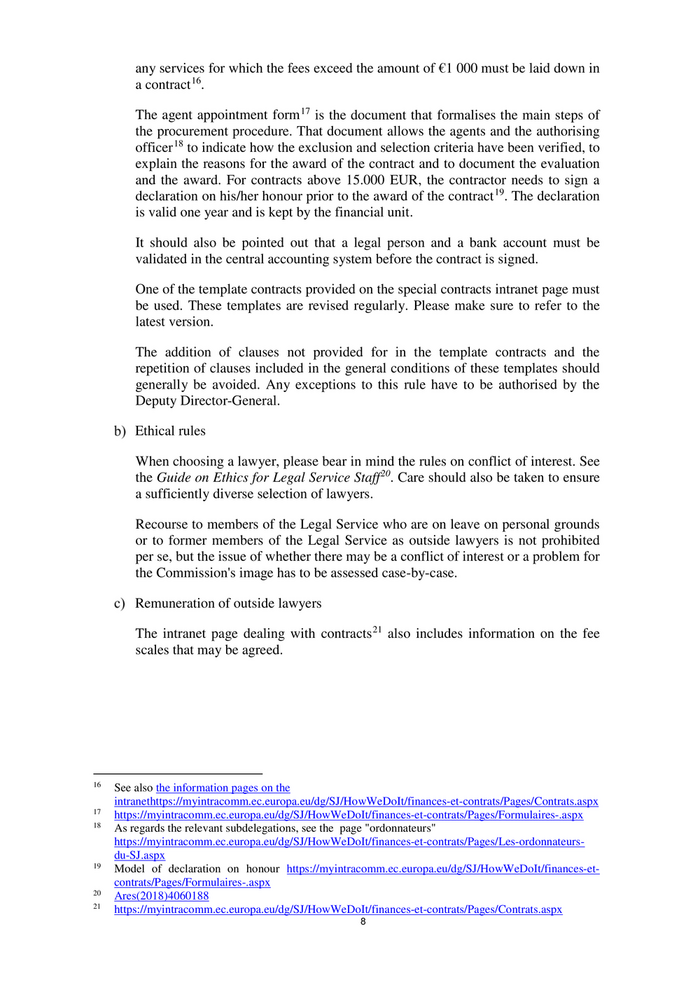
4) Powers of attorney 22 Powers of attorney for cases before the Court of Justice of the EU Powers of attorney are drawn up by multilingual revision assistants within the Quality of Legislation team, according to the following procedure: i) without an outside lawyer The original of the agent appointment form, initialled by the agents and signed by the heads of team of all agents, is sent by the assistant of the head of the team appointed as lead team, in paper format, to the following address: SJ POUVOIR, BERL 04/72. All emails concerning forms and powers of attorney must be sent to the SJ POUVOIR mailbox. The agent appointment form should reach the assistants in charge within one week of the case being notified. For direct actions and appeals, powers of attorney are drawn up on the basis of (the first page of) the application or appeal (with an ARES record number) and indicate the number of the Commission decision (C(20..)xxxx in VISTA) taken to refer the matter to the Court of Justice or to launch an appeal. The agent appointment form will be drawn up, at the agent's request, on the basis of the Commission decision. For interventions, the agent appointment form accompanies the notified case, which is sent to the team in charge of the matter. In the event of a decision to intervene, the duly completed form is returned to the team responsible for powers of attorney. ii) with an outside lawyer A paper file containing the agent appointment form and two copies of the contract is to be circulated to obtain the agreement of the Director-General. Once the DG has signed or initialled it, the assistants concerned start to draw up the power of attorney. The paper file is then passed on to the financial unit before being 23 returned to the relevant team . Powers of attorney are signed electronically by the Director-General via e-signature. The document containing the agent appointment decision and the powers of attorney is entered in the electronic file for the case at hand. This finalised document is assigned to the agents in ARES. Their assistant(s) can download the appropriate power of attorney in order to file it in e-Curia and mentioning the sending of the authority when registering the court procedural document in ARES. Powers of attorney for cases before national courts The agent prepares the file for the agreement of the Director-General, containing: the agent appointment form, duly completed (court hearing the action, parties, subject matter of the litigation, sums at stake, internal and external assignments, confidentiality of the case) + two copies of the draft contract with the outside legal 22 https://myintracomm.ec.europa.eu/dg/SJ/HowWeDoIt/gestion_documentaire/gestion_docs/edm- contentieux/Pages/greffe_contentieux.aspx 23 Circulation of the file: https://myintracomm.ec.europa.eu/dg/SJ/HowWeDoIt/finances-et- contrats/Documents/contrats/2.5%20Circuits_SJ_2013.ppt 9
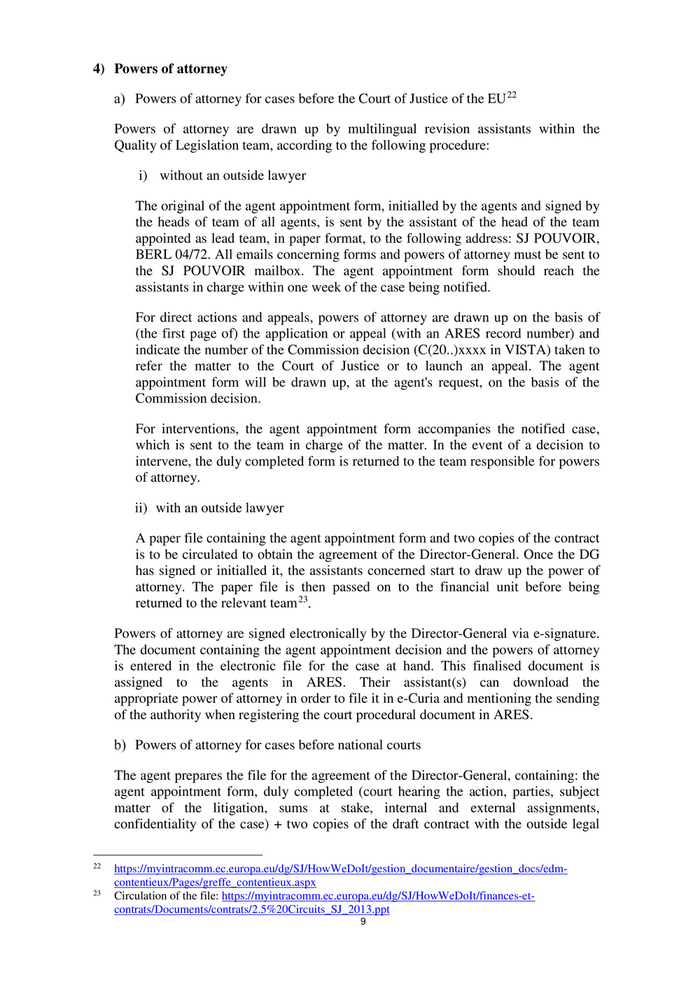
counsel, including the general terms and conditions + supporting documents (summons to the Commission to appear before the national court or Commission decision authorising the launching of the case before the court, any file notes or correspondence with the lawyer demonstrating negotiations of fees). If a power of attorney is required in a particular format, the agent attaches the power of attorney template provided by the lawyer. 5) Involvement of other teams The agents and the head(s) of the team(s) responsible for a case should ensure that any other teams which might have a say in the case are involved in good time in 24 drafting the written and oral submissions . A list of references for a preliminary ruling notified to the Commission, with a transcription of the questions put by the national courts, is sent to heads of team every week to keep them informed and allow them to raise the possibility of involving a particular team in a given case. II. How cases before the Court of Justice of the EU unfold 1) Determining the line to take and drafting submissions As soon as a case has been assigned to an agent within a team to work on the substance of the case, he or she asks the competent Commission departments for their observations with a view to drafting a submission. S/he should also seek the views of other departments whose field of activity will clearly be affected by the resolution of the litigation in question. In the case of a reference for a preliminary ruling, this request - which can be made via ARES at the appropriate hierarchical level - is accompanied by all language versions of the referral decision that may be useful for the details of the case to be understood. In the case of direct actions, the request is accompanied by the application and its annexes (or relevant extracts where the annexes are voluminous). Moreover, it may prove necessary to attach a summary of the application in English or French, if readily available, or a machine translation. If a full translation of the application is required, the department being consulted is responsible for requesting one from DGT. The request also triggers a deadline by which the consulted departments are asked to respond, which should be suited to the circumstances of the case and should not in principle exceed three weeks. The agents need to make sure that the departments submit their contributions by this deadline. The same procedure, with adapted deadlines, is followed for the preparation of other written submissions that have to be sent to the Court of Justice. Where possible, agents should strive to take the observations of the consulted departments into account in their submissions. Where a difference of opinion arises, appropriate contacts should be established between agents and their counterparts and, 24 Without seeking to be exhaustive, one might mention the following cases where this need arises: involvement of the INST team for any issues surrounding interpretation of the Charter and rules of procedure and for issues with institutional implications; mutual consultations between the JLS and SOC teams in cases dealing with the free movement of persons; between the SOC and FPE teams, regarding issues of social rights and protection standards for officials/employees; between the BUDG and AGRI teams for the Funds; between the AGRI and MIME teams for the environment and fisheries. 10
